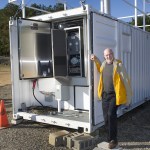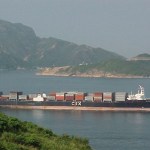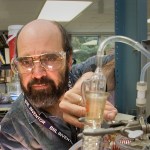Climate
Here's the latest field report from the MAGIC climate research collaboration:
Greetings from Honolulu! I had a wonderful trip over – mostly calm seas (we had a bit of rock and roll the last day out, but it wasn’t too bad), nice weather, some nice clouds to observe, and MAGIC data! In port in LA was busy, as usual, with MAGIC personnel getting off and on the ship, and others coming in for installation. Most of the instruments are up and running well, and of course there are a few that are being a bit problematic, but that’s not unusual for this point in a deployment.
Weather balloon launches…
Choose what the VLT observes - public vote on a science target one night this autumn
Ralph Cicerone Public Lecture - Contemporary Climate Change as Seen through Data - video of Ralph Cicerone lecture on Climate Change at the Aspen Center for Physics this summer
Cliff at Asymptotia summarises the "Future of Physics" public symposium at the Aspen Center for Physics.
With bonus pics of physicists gone wild!
How did I miss this?! - the Definitive Dunkin' Donuts study on which professions need coffee the most...
"scientists/lab technicians are the professions that need coffee the most,…
Reading P3 and mt I got stuck at
...economics makes grandiose claims to be the science of collective behavior, or even the science of collective happiness. Yet it dismisses any philosophically interesting aspects of these questions in favor of counting dollar-denominated transactions. Nevertheless, it claims for itself a unique position among the sciences, as the crux, the central weighing mechanism, for all public decision-making.
Leaving to the side, if I can for the moment, the "philosophically interesting" aspects I'm interested in the "central weighing mechanism" point.
It isn't clear to…
The Astrophysicist, when he has time, will have something to say about his reading of the physics of the material Tom Whipple sums up.
This situation however seems to be changing following a lengthy interview with a fellow out in Berkeley, California by the name of Robert Godes of Brillouin Energy. He has been working in this field for the last ten years and says that he not only has a reliable heat-producing device, but also understands the physics behind it - which he calls the Quantum Fusion Hypothesis. He says that this theory of just how low-energy nuclear reactions work has allowed…
Brookhaven Lab atmospheric scientist Ernie Lewis with a mini "weather" balloon aboard the Horizon
This guest post was written by Ernie Lewis, an atmospheric scientist at Brookhaven Lab, who is leading a year-long climate study aboard two Horizon Lines cargo ships, the Spirit and Reliance. He recently returned from a preliminary "cruise" from L.A. to Hawaii and back aimed at assessing conditions for deploying instruments aboard the ships during the actual study, dubbed MAGIC, which will run from October 2012 through September 2013.
Hawaii was wonderful, even though I only had a…
Not one to let physical and economic reality get in the way of a good one-liner, Newt Gingrich recently remarked that the United States could "open up enough oil fields in the next year that the price of oil worldwide would collapse." But as Sharon Astyk reports on Casaubon's Book, it can take years to develop such resources. And, as demonstrated by the hurdles that have tripped up the proposed Keystone XL pipeline, getting far-flung crude to the right refineries can be a logistical nightmare. Sharon says that most of the interred oil "won't be economically viable to extract or move," and…
On January 1, it was 48 degrees on my farm. My sons were at the playground, dressed in sweatshirts and jeans, rather than winter coats and mittens. Their ice skates had yet to be used this year. Their sleds haven't even come out of the garage. Walking out in the warm weather among the goats, I noticed my cowslips and primroses are up and there are buds on the pussy willows.
On the farm, we measure the severity of the winter by the final full barn cleaning before spring - the last one before heavy snow and ice make it impossible to get a wheelbarrow in and out of the barn. In a cold…
The Horizon Spirit, a 272-meter cargo ship, makes the round trip between Los Angeles and Hawaii every two weeks.
This is not a story about the latest mega cruise ship, with five swimming pools, 10 restaurants, a rock-climbing wall, and a casino. The vessel we're talking about, the Horizon Spirit, will be outfitted instead with radars, aerosol sampling devices, and other high-tech tools. But even without the fancy umbrella drinks, Ernie Lewis, an atmospheric scientist at the U.S. Department of Energy's (DOE) Brookhaven National Laboratory, can't wait to set sail.
Last month, he and several…
by Mark Pendergrast
This is my third and final post about the state of Japan's renewable energy efforts and other measures that are vital to prevent further climate change and to wean the country from fossil fuel and nuclear power. In my first post, I covered the public-health impacts of climate change and explained why Japan is good indicator of whether countries will be able to act quickly enough in the face of these threats. Japan's reliance on imported fossil fuels gives it a good reason to invest in alternatives, and its technological sophistication should help it develop renewable-…
by Mark Pendergrast
This is my second post in a series of three about the state of Japan's renewable energy efforts, which are vital to prevent further climate change and to wean the country from fossil fuel and nuclear power. In the previous post, I covered the public-health impacts of climate change and explained why Japan is a good indicator of whether countries will be able to act quickly enough in the face of these threats. Japan's reliance on imported fossil fuels gives it a good reason to invest in alternatives, and its technological sophistication should help it develop renewable-…
The UN climate talks going on in Durban aren't likely to lead to any major breakthroughs, but it would be nice if the US could at least avoid backsliding on the better-than-nothing steps it's taken on emissions. One important step for controlling emissions is ensuring the availability of affordable public transportation. Congress has helped make public transit more affordable for workers for the past three years by temporarily raising the limit on the monthly amount of pretax salary that can be set aside for transit. The problem is that limit, currently set at $230 per month, is set to drop…
by Mark Pendergrast
I'm going to talk about Japanese renewable energy in a minute, but first let me explain why.
In 2010, I published a book on public health (Inside the Outbreaks), and as a follow-up, I concluded that the overarching threat to the world's public health that we face in the coming decades is climate change, for a number of reasons. According to most scientists, three trends will conflate to create substantial problems. 1) We will run out of oil. 2) Climate change will have a profound impact on the environment and our lives. 3) The world's population will grow from 7…
On Class M, James Hrynyshyn reports a counter-intuitive survey conclusion: people who are more educated about science are less likely to be worried about climate change. The study posits that views on climate change are "cultural" and not purely scientific, making people want to "fit in" to a skeptical mainstream. But James writes, "Surely embracing reality, regardless of the opinions of your peers, is more rational that rejecting it?" Meanwhile Orac impersonates the anti-scientific sentiments of the Republican party on Respectful Insolence, writing "Anthropogenic global warming? Nope!…
Meteorology still depends on a bit of clairvoyance, but in the 19th century many sailors, fishermen, and farmers "had to rely on storm glass, an inexpensive and profoundly inaccurate divining tool." The mixture of "camphor crystals, potassium nitrate, ammonium chloride, water and alcohol" transitions from "solid to crystalline under circumstances that still aren't full understood." Frank Swain has details and pictures on SciencePunk, along with an account of the origin of forecasting in the British Isles. On Class M, James Hrynyshyn considers the complicated effects of clouds on world…
On Deltoid, Tim Lambert reports that Wolfgang Wagner, Editor-in-Chief of the journal Remote Sensing, has taken personal responsibility for the publication of a "problematic" paper and resigned his role. Wagner writes, "With this step I would also like to personally protest against how the authors and like-minded climate sceptics have much exaggerated the paper's conclusions," in stories such as "New NASA data blow gaping hole in global warming alarmism" (published by Forbes) and "Does NASA data show global warming lost in space?" (published by Fox News). On Class M, James Hrynyshyn asks "…
On Stoat, a new paper says that misinformation causes confusion about otherwise settled climate science, and suggests that the "direct study of misinformation" can potentially "sharpen student critical thinking skills, raise awareness of the processes of science such as peer review, and improve understanding of the basic science." William M. Connolley looks at more papers in another post, exclaiming "Good grief, the world is full of new science all of a sudden." Two of the papers offer explanations as to why atmospheric methane levels have not increased as much as expected: it could be "…
It is hard as heck to imagine that one of these days, I'll be longing for a hot day again, and for the fresh food that accompanies it, but it always happens. It is also hard, deep in the dog days, to realize that right now is when you have to start thinking about your fall garden. That's probably why so many of us start out beautifully, but peter out when the cold comes, running out of fresh things months before we have to.
Indeed, after a decade of working my farm, including the years when we ran a CSA, and many other years when we were gardening for ourselves, or raising perennial food and…
I first saw this a while back: maybe 2 years ago, but CR reminded me of it recently. As far as I can tell it is genuine; the CIA offer to sell you it, though if you try to buy you get a 404. Why you'd buy it when others have it for free I don't know. I don't seem to have blogged it then; others did but just to push their own tedious ends (yes, its global cooling come again, don't all switch off at once).
There are a couple of things to look at in a report like this. The most interesting is, presumably, what did the CIA think about climate change then. Slightly less interesting, but revealing…
This guest post is written by Stephen R. Springston, an atmospheric chemist at Brookhaven National Laboratory. After receiving his Ph.D. in chemistry from Indiana University, he completed a postdoctoral fellowship at the University of Utah before joining Brookhaven in 1986.
Stephen Springston
After studying clouds and climate in Oklahoma during tornado season and storms atop Colorado mountaintops, a group of atmospheric scientists from Brookhaven National Laboratory will soon be helping to sample the skies over India.
We've been asked to share our expertise on conducting ground and…
When I decided yesterday to watch the Republican candidates debate, I created a scorecard to use while I observed the two-hour event. I was interested particularly in exchanges related to public health topics, such as access to health care, and clean air and safe drinking water. Within minutes of first tuning in, I remembered how these multi-candidate debates are heavy on rhetoric, but light on policy details. I heard the participants harp on "ObamaCare," and "burdensome regulations," as well as make promises to "de-fund," and "repeal," but there were too few substantive points on public…


